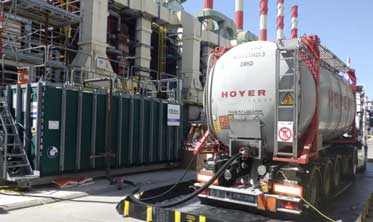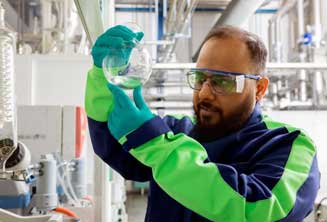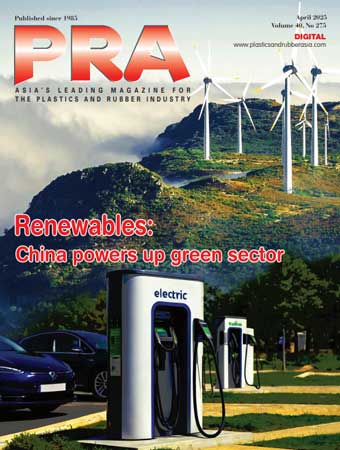Green news: Ineos starts up recycled plastics feedstock in France; Neste/Chevron Lummus to develop sustainable fuels from lignocellulosic biomass

Chemical firm Ineos says its cracker in Lavera, France, has received the first deliveries of pyrolysis oil made from recycled plastic waste that it will use to make virgin-quality polymers. Pyoil made from advanced recycling of waste plastics will be cracked to produce ethylene, propylene for onwards production of PE, PP at Ineos plants in France and Italy.
By converting the cracker and securing access to pyrolysis oil, Ineos adds it is building capability that will help customers meet the EU’s stringent regulatory targets and sustainability goals, for food contact, medical and sensitive plastic packaging to have a minimum of 10% recycled content by 2030.
These new grades will help satisfy stringent EU regulatory requirements for other demanding applications such as caps and closures, milk bottles, and water pipes.
Part of the Lavera cracker had to be adapted to enable production of materials from renewable naphtha made from sources such as biomass, organic waste, or recycled materials, alongside traditional feedstocks.
The pyrolysis oil is made in Europe from post-consumer plastic packaging waste that cannot be processed by mechanical recycling. This process of making pyrolysis oil is called advanced recycling. The pyrolysis oil will be used in the cracker to make recycled ethylene and propylene for conversion into virgin-quality, recycled PE and PP in the Ineos polymer plants located in Lavera and Sarralbe (France), and Rosignano (Italy).
The renewable nature of these products is independently certified under the International Sustainability and Carbon Certification scheme (ISCC PLUS), which validates that any renewable feedstocks have been tracked through the production process using mass balance principles, and that all renewable and recycled claims are accurate.
The EU Packaging and Packaging Waste Regulation (PPWR) has set out ambitious targets for recycling packaging waste for 2030 and 2040. Advanced recycling technologies play a critical role in meeting the growing demand for the safe use of recycled materials, needed to achieve minimum levels of recycled content in plastic packaging.
Advanced recycling enables the production of end products that can be recycled again and again, bringing true circularity to consumer products. This technology ensures plastic does not end up in landfill or incineration, and reduces the use of fossil based raw materials.
Located 30 miles west of Marseille, the Lavera site is one of the largest petrochemicals sites in Europe. The cracker and polymer plants have been wholly owned by Ineos since April 2024.
In other news, sustainable materials firm Neste and Chevron Lummus Global (CLG), a technology provider for the production of renewable and conventional transportation fuels, are partnering to drive innovation in renewable fuels. The companies are looking at developing a new technology enabling conversion of lignocellulosic biomass into high-quality, lower-emission renewable fuels, such as sustainable aviation fuel (SAF) and renewable diesel.

The joint development has reached the first major milestone, and the piloting results indicate that the new technology could offer a significant performance improvement over existing technologies for lignocellulosic raw materials. Neste and CLG are currently validating the technology and targeting readiness to scale up the technology to commercial scale.
Vast amounts of lignocellulosic waste and residues from existing forest industry and agricultural production remain underutilised and could be leveraged as valuable renewable raw materials. These waste and residues are generated, for instance, in harvesting operations and forest industry processing, or they are end-of-life wood materials.
“Lignocellulosic waste and residues can make an important contribution as a new and scalable raw material pool for renewable fuels. The technology development with CLG has progressed well, and we are very encouraged by the initial results. Unlocking the potential of these promising raw materials would allow us to meet the growing demand of renewable fuels in the long-term and contribute to ambitious greenhouse gas emission reduction targets,” describes Lars Peter Lindfors, Senior Vice President of Technology and Innovation at Neste.
The strategic partnership combines Neste's pioneering expertise and global leadership in renewable fuels as well as CLG's extensive experience and proven track record in developing and licensing market-leading refining technologies.
“The successful proof of concept marks a major milestone in the collaboration, advancing the efforts towards commercial-scale production of renewable fuels from abundantly available but technically challenging lignocellulosic raw materials. We are confident this partnership will pave a new pathway for producing renewable fuels, leveraging our versatile and scalable hydroprocessing technology platform,” says Rajesh Samarth, CEO of CLG.
(PRA)SUBSCRIBE to Get the Latest Updates from PRA Click Here»









